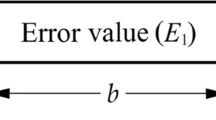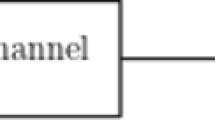Abstract
Interest for communication with short block length messages has gained much attention recently in many of the current and emerging wireless applications. Classical capacity approaching codes exhibit performance degradation with short block length codewords and hence are not suitable for applications that demand short block length communication. A novel performance enhanced reliability based direct decoding algorithm, that makes use of reliability values and encoder structure, has been proposed recently by the authors for short block length turbo codes. The proposed algorithm is a replacement for the conventional MAP based iterative turbo decoding algorithm. This is the first attempt (to the best of our knowledge) that used the reliability values directly instead of the log likelihood ratio (LLR) values that are commonly used in the conventional decoding algorithm. The proposed algorithm has shown a conspicuous performance improvement as well. Typically it has 2.45 dB coding gain at a BER of \(10^{-3}\) and channel adaptive complexity over AWGN channel with BPSK modulation for a code rate of \(\frac{1}{4}\). The conventional iterative algorithm formulation is based on a Gaussian noise model assumption. Any deviation from Gaussian assumption calls for changes in the branch metric computation since it uses the channel reliability of Gaussian noise. This modified branch metric reflects as modifications in the forward metric, backward metric and hence in LLR computation. In contrast to this, the direct decoding algorithm is a generic scheme and can be adapted for both Gaussian and different non-Gaussian distributions as well. In this paper, a generalization of this generic reliability based direct decoding algorithm without the Gaussian restriction, is presented.










Similar content being viewed by others
Availability of Data and Material
The datasets generated during and/or analysed during the current study are available from the corresponding author on reasonable request.
Code Availability
The Python code written for the current study are available from the corresponding author on reasonable request.
References
Shu, L., & Daniel, J. C. (2010). Error control coding. Pearson Education.
Shridhar, B. D., & Itagib, I. (2020). Recurrent neural network based turbo decoding algorithms for different code rates. Journal of King Saud University - Computer and Information Sciences. https://doi.org/10.1016/j.jksuci.2020.03.012.
Vaniya, S. N., Kumar, N. & Sacchi, C. (2016). Performance of iterative turbo coding with nonlinearly distorted OFDM signal. In IEEE annual India conference (INDICON) (pp. 1–5).
Shirvanimoghaddam, M., Mohamadi, M. S., Abbas, R., et al. (2019). Short block-length codes for ultra-reliable low latency communications. IEEE Communications Magazine, 57(2), 130–137.
Matsumine, T., & Ochiai, H. (2018). Capacity-approaching non-binary turbo codes: A hybrid design based on EXIT charts and union bounds. IEEE Access, 6, 70952–70963.
Liva, G., Paolini, E., Matuz, B., Scalise, S., & Chiani, M. (2013). Short turbo codes over high order fields. IEEE Transactions on Communications, 61(6), 2201–2211.
Luvisotto, M., Pang, Z., & Dzung, D. (2017). Ultra high performance wireless control for critical applications: Challenges and directions. IEEE Transactions on Industrial Informatics, 13(3), 1448–1459.
Zhan, M., Wu, J., Wen, H., & Zhang, P. (2018). A novel error correction mechanism for energy-efficient cyber-physical systems in smart building. IEEE Access, 6, 39037–39045.
Bennis, M., Debbah, M., & Poor, H. V. (2018). Ultra reliable and low-latency wireless communication: Tail, risk, and scale. Proceedings of the IEEE, 106(10), 1834–1853.
Madhavsingh, I., & Tulsi, P. F. (2021). Overview of the challenges and solutions for 5G channel coding schemes. Journal of Information and Telecommunication, 5(4), 460–483.
Danish, M. N., Pasha, S., A., & Hashmi, A. J. (2021). Quasi-cyclic LDPC codes for short block-lengths. IEEE aerospace conference. https://doi.org/10.1109/AERO50100.2021.9438238.
Wang, F., Jiao, J., Zhang, K., Wu, S., & Zhang, Q. (2021). Adjustable ordered statistic decoder for short block length code towards URLLC. In International conference on wireless communications and signal processing. https://doi.org/10.1109/WCSP52459.2021.9613322.
Liva, G., Gaudio, L., Ninacs, T., & Jerkovits, T. (2016). Code design for short blocks: A survey. arXiv preprint. arXiv:1610.00873 [cs.IT]. Accessed 20 May 2019.
Durisi, G., Koch, T., & Popovski, P. (2015). Towards massive, ultra reliable, and low-latency wireless: The art of sending short packets. arXiv:1504.06526. Accessed 20 May 2019.
Sadjadpour, H. R., Salehi, M., Sloane, N. J. A., & Nebe, G. (2002). Interleaver design for short block length turbo codes. In International conference on communications (pp. 628–632).
Isaka, M., Fossorier, M. P. C., & Imai, H. (2004). On the suboptimality of iterative decoding for turbo-like and LDPC codes with cycles in their graph representation. IEEE Transactions on Communications, 52(5), 845–854.
Weithoffer, S., & Wehn, N. (2017). Enhanced decoding for high-rate LTE turbo-codes with short block length. In Proceedings of international conference on communications workshops (ICC workshops) (pp. 967–972).
Dadi, M. I., & Marks, R. J. (1987). Detector relative efficiencies in the presence of Laplace noise. IEEE Transactions on Aerospace and Electronic Systems, 23(4), 568–582.
Mertz, P. (1961). Model of impulsive noise for data transmission. IRE Transactions on Communications Systems, 9(2), 130–137.
Palahina, E., Gamcova, M., Gladisova, I., Gamec, J., & Palahin, V. (2018). Signal detection in correlated non-gaussian noise using higher-order statistics. Circuits, Systems, and Signal Processing, 37, 1704–1723.
Miller, J., & Thomas, J. (1972). Detectors for discrete-time signals in non-Gaussian noise. IEEE Transactions on Information Theory, 18(2), 241–250.
Jiang, Y., Kim, H., Asnani, H., Kannan, S., Oh, S., & Viswanath, P. (2019). Deep turbo: Deep turbo decoder. arXiv preprint. arXiv:1903.02295 [eess.SP].
Shafieipour, M., Lim, H., & Chuah, T. (2011). Decoding of turbo codes in symmetric alpha-stable noise. ISRN Signal Processing, 2011, 1–7.
Salija, P., Yamuna, B., Padmanabhan, T. R., & Mishra, D. (2019). A novel reliability based high performance decoding algorithm for short block length turbo codes. International Journal of Ad Hoc and Ubiquitous Computing (in press).
Miller, J., & Thomas, J. (1976). The detection of signals in impulsive noise modeled as a mixture process. IEEE Transactions on Communications, 24(5), 559–563.
Marks, R. J., Wise, G. L., Haldeman, D. G., & Whited, J. L. (1978). Detection in Laplace noise. IEEE Transactions on Aerospace and Electronic Systems, 14(6), 866–872.
Zhao, C., Zhen, S., Yukui, P., & Liuguo, Y. (2022). Generalized sparse codes for non-Gaussian channels: Code design, algorithms, and applications. Fundamental Research. https://doi.org/10.1016/j.fmre.2021.12.006
Cai, Y., Morris, J. M., Adali, T., & Menyuk, C. R. (2003). On turbo code decoder performance in optical-fiber communication systems with dominating ASE noise. Journal of Lightwave Technology, 21(3), 727–734.
Majoul, T., Raouafi, F., & Jaidane, M. (2009). Turbo decoding performance in non Gaussian noise channels. In Proceedings of sixth international multi-conference on systems, signals and devices (pp. 1–4).
Chuah, T. C. (2005). Robust iterative decoding of turbo codes in heavy-tailed noise. IEE Proceedings Communications, 152(1), 29–38.
Faber, T., Scholand, T., & Jung, P. (2005). On turbo codes for environments impaired by impulsive noise. In Proceedings of IEEE sixtieth vehicular technology conference (pp. 2268–2272).
Paul, J., & Matt, B. (2013). Beta distribution. http://pj.freefaculty.org/guides/stat/Distrins/DistributionWriteups/Beta/Beta.pdf. Accessed June 2019.
Ermolova, N. Y., & Tirkkonen, O. (2016). Using beta distributions for modeling distances in random finite networks. IEEE Communications Letters, 20(2), 308–311.
Srinivasa, S., & Haenggi, M. (2010). Distance distributions in finite uniformly random networks: Theory and application. IEEE Transactions on Vehicular Technology, 59(2), 940–949.
Eltoft, T., Taesu, K., & Te-Won, L. (2006). On the multivariate Laplace distribution. IEEE Signal Processing Letters, 13(5), 300–303.
Skomal, E. N. (1965). Distribution and frequency dependence of unintentionally generated manmade VHF/UHF noise in metropolitan areas. IEEE Transactions on Electromagnetic Compatibility, 7(4), 420–427.
Fennick, J. H. (1969). Amplitude distributions of telephone channel noise and a model for impulse noise. The Bell System Technical Journal, 48(10), 3243–3263.
Bowling, S. R., Khasawneh, M. T., Kaewkuekool, S., & Cho, B. (2009). A logistic approximation to the cumulative normal distribution. Journal of Industrial Engineering and Management, 2(1), 114–127.
Acknowledgements
The authors acknowledge the support of this research from the ISRO (Space Application Center), sponsored project ISRO/RES/3/732/19-20.
Funding
This work was supported by the ISRO (Space Application Center), sponsored project ISRO/RES/3/732/19-20.
Author information
Authors and Affiliations
Corresponding author
Ethics declarations
Conflicts of interest
The Authors declare that there is no conflict of interest
Additional information
Publisher's Note
Springer Nature remains neutral with regard to jurisdictional claims in published maps and institutional affiliations.
Rights and permissions
About this article
Cite this article
Salija, P., Yamuna, B., Padmanabhan, T.R. et al. A Generic Reliability Based Direct Decoding Algorithm for Turbo Codes. Wireless Pers Commun 125, 785–801 (2022). https://doi.org/10.1007/s11277-022-09577-2
Accepted:
Published:
Issue Date:
DOI: https://doi.org/10.1007/s11277-022-09577-2




